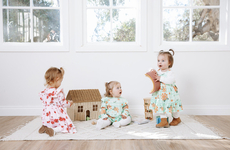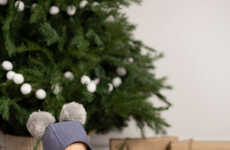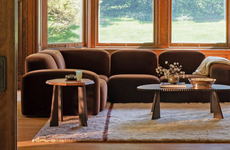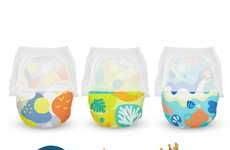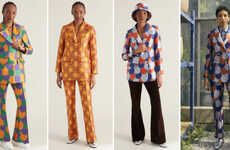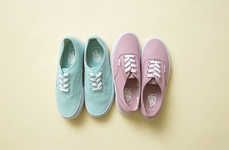
loskop Bibs are Made Using Traditional South African Shweshwe Fabric
Michael Hemsworth — January 30, 2017 — Art & Design
References: instagram & loskopshop
The loskop baby bibs are a new collection of accessories for young children that are made using high-quality materials with a cultural backstory. Each of the loskop bibs are created using traditional South African shweshwe fabric that has been sourced in the Eastern Cape. This is paired with a simple terry cloth lining and nickel-plated brass snap fastener for a fashionable yet inherently practical accessory.
The shweshwe fabric used to create the loskop baby bibs is made from pure cotton and is such a popular material in South Africa that it is thought of as the country's own tartan. The material is exclusively manufactured in South Africa, which gives it a true cultural identity beyond being beautifully vibrant and complex.
The loskop bibs are handmade in Toronto, Canada by South Africa-born artisan Andy. The brand name loskop translates to "loose head' in Afrikaans, which is used as a term of endearment to describe friends or loved ones with their heads in the clouds.
The entire collection of bibs from loskop can be seen over at the brand's website or on Instagram.
The shweshwe fabric used to create the loskop baby bibs is made from pure cotton and is such a popular material in South Africa that it is thought of as the country's own tartan. The material is exclusively manufactured in South Africa, which gives it a true cultural identity beyond being beautifully vibrant and complex.
The loskop bibs are handmade in Toronto, Canada by South Africa-born artisan Andy. The brand name loskop translates to "loose head' in Afrikaans, which is used as a term of endearment to describe friends or loved ones with their heads in the clouds.
The entire collection of bibs from loskop can be seen over at the brand's website or on Instagram.
Trend Themes
1. Cultural Baby Accessories - The loskop bibs demonstrate a trend of incorporating traditional cultural fabrics into baby products, providing an opportunity for businesses to create culturally-inspired accessories for infants.
2. Handmade and Artisanal Products - The handmade nature of the loskop bibs reflects a trend towards artisanal products, presenting an opportunity for businesses to offer unique, handcrafted items.
3. Ethical Sourcing and Manufacturing - The use of ethically sourced shweshwe fabric and handmade production methods highlights a trend towards ethical sourcing and manufacturing, allowing businesses to differentiate themselves by prioritizing sustainability and fair trade.
Industry Implications
1. Baby Products - The loskop bibs cater to the baby product industry, where incorporating cultural fabrics and offering handmade options could appeal to customers seeking unique and meaningful accessories for their infants.
2. Fashion and Accessories - The cultural fabric used in the loskop bibs can disrupt the fashion and accessories industry by showcasing the beauty and versatility of traditional fabrics, providing inspiration for designers to incorporate such fabrics into their collections.
3. Cultural Heritage and Tourism - The loskop bibs highlight the cultural significance of shweshwe fabric, suggesting opportunities for the cultural heritage and tourism industry to promote and showcase traditional fabrics as an integral part of a region's identity and history.
1.8
Score
Popularity
Activity
Freshness


